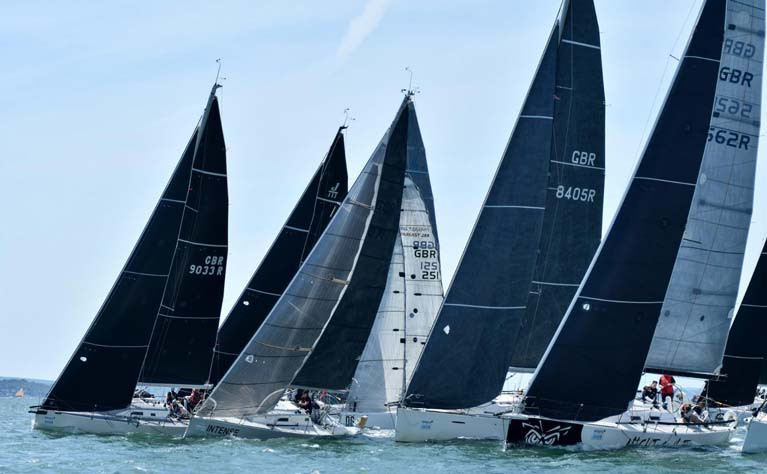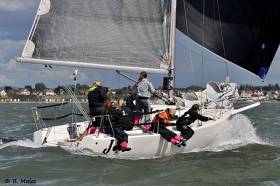Displaying items by tag: Women’s Open Keelboat Championships
Dubarry Women’s Open Keelboat Championship 2021 Teams up with RYA/British Keelboat League
The Women's Open Keelboat Championship (WOKC) will be returning to Hamble for its 12th edition in June 2021.
After sadly having to cancel the 2020 edition of the event organiser say they can’t wait to see lots of boats on the start line of WOKC 2021.
The 2021 event will take place on the 5th-6th of June out of the Royal Southern Yacht Club.
Alongside its IRC classes, WOKC has teamed up with the RYA to join the event with the British Keelboat League. This will give more opportunities to women who would like to compete at the event.
For the first time, teams will be able to enter the event and race in a competitive fleet without having to find a boat to use. Teams of 4 women can enter and compete in the event without having to find a boat to use/charter opening up the event to sailors who don’t have access to a keelboat. Further to that, the winners of the RS21/BKL fleet will qualify for the British Keelboat League Final.
 RS21 racing
RS21 racing
In addition to this, WOKC has also increased the upper limit of the IRC rating band to 1.150. This is to include all Performance 40’s and the new, exciting Cape 31 class should these boats wish to enter.
WOKC were able to do this as there will now be two separate race courses, one for the RS21’s and the other for the IRC fleet.
“We’re very excited to be joining forces with the British Keelboat League, it’s such a great way to get more sailors out on the water. It means we can open the event to more women from all over the country, allowing those who do not have access to yachts to enter the event. We are extremely grateful to Dubarry for their continued support and Royal Southern Yacht Club who are helping us to grow the event.” said Tor Tomlinson, Event Organiser.

“It is great that we are able to bring a British Keelboat League Qualifier to the Women’s Open Keelboat Championship this year. The WOKC is a great opportunity for talented sailors to get together and compete against their peers but it can be hard for those not already in the loop to get involved. By adding the BKL to the event we hope to see many more sailors get involved and hopefully, they can make connections to do more yacht and keelboat racing in the future. I am really looking forward to this year's racing, said Jack Fenwick, RYA Keelboat Development Manager.
Entries open for IRC at the beginning of April and with early bird entry of £80, available until 7th May. After that date, the entry fee will increase to £100. Entries will be open on the Royal Southern website here
Entries for BKL/RS21 racing is £330 per team. This includes entry, coaching and boat charter here
The Women’s Open Keelboat Championship was founded in 2008 by a group of passionate female sailors who wanted to compete in challenging racing against other women. Over the years the team behind the regatta has evolved but the vision has remained the same.
The organisers are all volunteers and donations of support, time and charity raffle prizes are all gratefully received. The event is non-profit making with all proceeds going to a nominated charity.
The Dubarry sponsored UK Women’s Open Keelboat Championship (WOKC) will be hosted on the 13th/14th June from the beautiful location of the Royal Southern Yacht Club.
Ireland has previously been successful at the event with Howth Yacht Club helmswoman Laura Dillon winning in 2016.
Dubarry returns as title sponsor, having been a generous supporter of the championships since its inception in 2008 and having been the title sponsor for the last eight events.
Participants in the Dubarry Women’s Open Keelboat Championships will have the opportunity to win much-admired Dubarry items, which will be available as prizes for class winners and in the overall Championship.
“We are very excited for WOKC 2020, we have a few changes this year including our move to the Royal Southern but are very pleased with Dubarry’s continuing support. After the great success of the RS21 class in the 2019 edition, the event is opening entries for a sportsboat class and hope that this will allow even more women to get involved!” said Tor Tomlinson of the WOKC organising committee.
The inclusion of the sportsboat class will allow boats such as J70’s, J80’s and SB20 enter and race under the Royal Southern’s handicap rather than having to get an IRC certificate.
The Women’s Open Keelboat Championship was founded in 2008 by a group of passionate female sailors who wanted to compete in challenging racing against other women. Over the years the team behind the regatta has evolved but the vision has remained the same.
Dubarry of Ireland will be returning for the fifth year as title sponsor of the Women’s Open Keelboat Championships.
The Dubarry Women’s Open Keelboat Championships is an all-female keelboat regatta taking place in the Solent on 4-5 June 2016 and the organisers believe it is the only event of its kind in the UK.
Dubarry take inspiration from the rugged Wild Atlantic Coast and Galway’s great sailing heritage to create the highest quality leather footwear, deck shoes and sailing boots as well as a range of clothing, leather goods and accessories. Participants in the Dubarry Women’s Open Keelboat Championships will have the opportunity to win much admired Dubarry items, which will be available as prizes for class winners and in the overall Championship.
“The Dubarry Women’s Open Keelboat Championships is an event that we thoroughly enjoy being involved with, both on and off the water. The superb location and excellent organisation is complemented by eager participants with a great sense of camaraderie, making this such a great event for us to be associated with” said Marketing Director, Michael Walsh.
WOKC aims to provide high quality racing amongst female sailors whilst also offering an environment that is encouraging to female sailors newly entering the competitive side of the sport.
Jen Smyth from the WOKC organising team adds, “We are extremely grateful to Dubarry for their continued support, which enables this regatta to continue. The event is great fun, and although we compete passionately on the water the atmosphere is friendly and welcoming. We actively encourage newcomers to join us, so if you are a female skipper or boat owner, please get in touch to find out more.”
Hosted at Hamble River Sailing Club (HRSC), the regatta format focuses on IRC racing with a recommended rating of 0.88 to 1.101, split into suitable classes. One Design Classes will also be catered for if there are sufficient entries. For those with an available boat, but no current IRC certificate, the RORC Rating Office will issue a Limited Validity certificate for single event rating.
The popular Frocks & Flip-flops party takes place after racing on the evening of Saturday 4 June. Lady racers, their supporters and friends can let down their hair and raise some valuable funds for charities.
Entries are now open and early entry is advised to take advantage of the earlybird booking fee of £70, available until 17:00 on Friday 27 May. After that date, entry fee will increase to £90.

























































